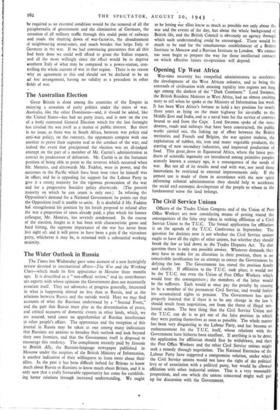Opening Up West Africa
War-time necessity has compelled administrators to accelerate the development of the West African colonies, and to bring the externals of civilisation with amazing rapidity into regions not long ago among the darkest of the " Dark Continent." Lord Swinton, the British Resident Minister in West Africa, had an almost exciting story to tell when he spoke at the Ministry of Information last week. It has been West Africa's fortune to hold a key position for nearly . three years as -lying on the main highway for air-traffic to the Middle East and India, and as a naval base for the service of convoys bound to and from the Cape. Lord Swinton spoke of the aero- dromes, roads and railways that have been constructed, the public works carried out, the linking up of effort between the British territories and FrenCh and Belgian, the war against malaria, the exploitation of rubber, tin, iron and many vegetable products, the starting of new secondary industries, and improved production of food. This great drive in Equatorial Africa, where the latest pro- ducts of scientific ingenuity are introduced among primitive peoples scarcely known a century ago, is a consequence of the needs of war. But not all of its results need end with war, nor need these innovations be restricted to external improvements only. If the utmost use is made of them in accordance with the new spirit informing colonial administration they should help to accelerate the social and economic development of the people to whom in the fundamental sense the land belongs.


























 Previous page
Previous page